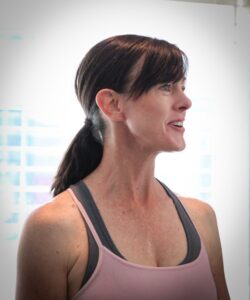(FRECKENHAM, United Kingdom) — Tara Kusch is the owner of Evolved Pilates, where she and her staff train clients ranging in age and athletic ability in Surrey, U.K. But Kusch, who went from teaching multiple in-person classes a week at the main studio in Surrey to teaching many of her classes over the internet from her home studio in Suffolk, said this is her new normal.

Tara Kusch. Owner of Evolved Pilates. [Credit: Tara Kusch]
Kusch established her studio in Surrey in 2013 and is a certified trainer in Pilates using mat and large equipment. Now that COVID restrictions have eased, Kusch trains a select number of clients from her home studio in Suffolk, like horseback riders who benefit from learning how to keep a neutral spine and symmetrical posture.

Tara Kusch trains with client. [Credit: Tara Kusch]
Kusch said her clients “didn’t want to lose what they had.” This led her to make her classes available through the internet in two ways: a live online session for training and by giving clients access to pre-recorded sessions.
Linda Parker, a client of Kusch’s for seven years, participated in the internet classes over lockdown and said the virtual sessions were her savior. She said they kept her active while stuck at home, both physically and mentally.
“Engaging was so good for my mindset,” Parker said.
But Kusch said these changes do not come without challenges. “[At the beginning of lockdown,] we had a huge amount of clients go virtual,” Kusch said. But towards the end of the first lockdown, her internet-based sessions had about a third of their initial lockdown numbers.
Many factors played into the drop in numbers, Kusch said, such as parents having to take care of children who were home from school. She recalled one mom with four children who told her, “I’m sorry, Tara, I just can’t do it.”

Clients training at Evolved Pilates in Surrey, U.K. [Credit: Tara Kusch]
“The only reason we are still viable is because of the government grants,” says Kusch.
A spokesperson for the West Suffolk Council said it’s given out £120 million in aid over the pandemic.
“Throughout the pandemic, we have been working hard with businesses to help them adapt, survive and recover,” The spokesperson said. “This has included helping businesses across West Suffolk access £120 million in Government business grants and business rates relief as well as supplying information and advice on COVID guidance and where to get help.
With lockdown restrictions lifting, Evolved Pilates can finally welcome customers back into the physical studio. Sessions over the internet are still available — it’s one of the many ways that Kusch said the pandemic permanently changed her business. The studio in Surrey now holds 23 classes a week, and classes are at averaging around 66% capacity with three to four clients in each session.
Despite the numerous challenges, Evolved Pilates was able to survive at a time when many other businesses didn’t. Kusch said she is looking ahead. “I’m optimistic for the future,” she said.
Correct: An earlier version of this article misstated that over 170,000 businesses in the U.K. closed in 2020. The earlier version also misrepresented what kind of Pilates the instructor was certified in.

